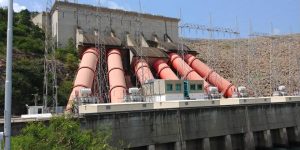Over 500 students from nine schools in the Korle Gonno catchment area have benefitted from a six months’ supply of sanitary materials.
The support from the Ghana Chamber of Mines is to help the students concentrate on the important activities in school without the torture of worrying about how to afford them.
Dr Sulemanu Koney, the Chief Executive Officer of the Chamber, made the presentation at its Purple Peach Project event at Korle Gonno to promote menstrual hygiene.
The beneficiary schools include James Town Methodist Basic School, Hijaz Islamic Basic School, St Mary’s R/C Girls Basic School, and St Michael and All Angels Basic School.
The rest are Methodist B Basic School, Dr. F.V. Nanka Bruce JHS, Methodist A Basic School, Ministry of Health Basic School, and Kitson Mills Primary School.
He said the donation, worth GH¢30,000.00, would be instrumental in improving the hygiene of these young girls as they strive to reach greater heights in life
He said the Chamber called on the government to take a second look at the 20 per cent luxury tax and 12.5 per cent VAT that applies to sanitary pads imported.
The Chamber said it had ostensibly made the commodity quite expensive and inaccessible to many vulnerable girls in Ghana.
Dr Koney urged pharmaceutical companies in Ghana to take advantage of the opportunity to manufacture the product at a relatively lower price to support girls and women.
He said the Chamber’s Corporate Social Investment Initiatives (CSI) were tied to the corporate strategies of their respective members.
He said their primary focus was to put people first by improving their wellbeing and to ensure the sustainability of the activities that we undertake.
Dr Koney said, in line with this, the CSI programmes had two broad objectives to support the training and development of local people in engineering, construction, electrical and other technical fields; and to provide support for research and charitable projects that are beneficial to mining communities and the entire nation.
He said the Chamber’s objective with the Purple Peach Project was to support the increasing number of adolescent girls in not-so-endowed communities to access sanitary services for improved personal hygiene.
“Menstruation is a fact of life and a natural monthly occurrence for the 1.8 billion girls and women of reproductive age around the world,” he added.
He said, “we cannot continue to allow cost to deny girls access to this very important product for the management of monthly menstrual cycle in a dignified and healthy way.”
The CEO said it was, therefore, imperative for society to prioritize the health of these girls as the availability, access, and ability to purchase such sanitary services could be critical to the success or failure of these girls in life.
He said adolescent girls face stigma, harassment, and exclusion in varied forms, which have sweeping negative impacts on their lives.
“A worrying aspect of the lack of such sanitary services is the impact on their attendance and participation in school and community life,” he said.
He said this was compounded by the level of stress and anxiety that the issue generates among girls.
Dr Koney called on stakeholders to take a crucial noted that menstrual health and hygiene were keystones to building adolescent girls’ confidence and potential.
He said the Chamber was proud to join hands with the Ladies Lead Foundation to drive home the message that “we must all contribute to improve the well-being of our girls if we want them to stay in school and blossom into invaluable assets for the good of our nation.”
The CEO said this potential could not be harnessed if the country fail to put systems in place in our educational system to provide the best of support services to them.
He said as a country it should be able to invest in innovative technologies to produce cost effective materials to support adolescent girls all around the country.
He said member companies of the Chamber would continue to invest in host communities and advocate for improved services for all and sundry, especially the vulnerable and underprivileged.
He urged the students to endeavour to focus on their studies so that the investments made by the State, their parents, and other benefactors would not go down the drain.







